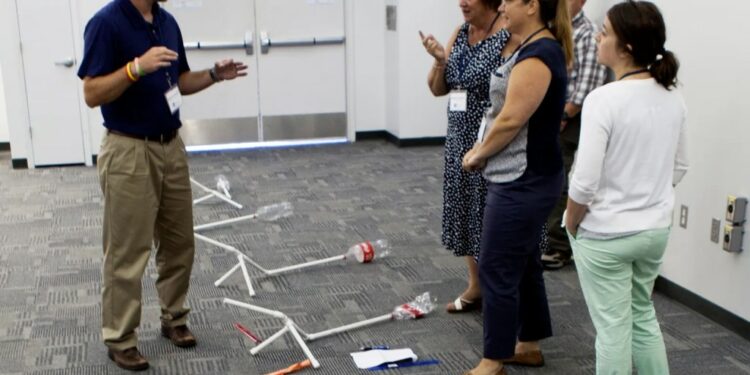What resources does the NASA STEM Engagement program offer to educators to make science education engaging and relevant?
Unlocking the Universe: Exciting NASA Science Opportunities for Educators in the Classroom
NASA, the renowned space agency, is not only on a mission to explore the universe but also to inspire the next generation of space enthusiasts and scientists. To achieve this goal, NASA offers a myriad of science opportunities for educators in the classroom. These initiatives aim to immerse students in the wonders of space exploration, providing hands-on experiences that foster curiosity and passion for science. In this article, we’ll delve into the exciting NASA science opportunities available for educators and how they can leverage these resources to ignite a love for STEM subjects in their students.
NASA Science Initiatives for Educators:
The following are some of the key science initiatives offered by NASA for educators:
NASA Educator Professional Development
NASA’s Educator Professional Development program provides educators with tools and resources to enhance their teaching of STEM subjects. This initiative offers workshops, webinars, and online resources designed to deepen educators’ understanding of NASA missions and science. By participating in these professional development opportunities, educators can gain valuable insights into how to integrate real-world space exploration into their curriculum.
NASA STEM Engagement
The NASA STEM Engagement program offers a wealth of resources, including lesson plans, activities, and multimedia content, for educators to bring the excitement of space exploration into their classrooms. From engineering challenges to virtual tours of NASA facilities, this initiative provides educators with an array of tools to make science education engaging and relevant.
NASA@ My Library
NASA@ My Library is a project designed to engage public audiences and connect them with the science, technology, and exploration of NASA. Through this initiative, educators can access a range of resources, such as STEM kits, professional development opportunities, and virtual events, to inspire and educate their students about the wonders of the universe.
Benefits and Practical Tips for Educators:
Engaging with NASA’s science initiatives can offer numerous benefits for educators and their students, including:
Inspiring students’ interest in STEM subjects
Enriching the curriculum with real-world applications of science and technology
Providing educators with professional development opportunities
Fostering a sense of wonder and curiosity about the universe
To make the most of NASA’s science opportunities, educators can follow these practical tips:
Stay updated on NASA’s latest resources and initiatives by regularly visiting the official NASA website
Collaborate with other educators to share best practices and innovative ideas for integrating NASA science into the classroom
Encourage hands-on learning experiences, such as science experiments and model rocket building, to make STEM education more interactive and impactful
Case Studies:
Several educators have successfully leveraged NASA’s science opportunities to enhance their teaching and inspire their students. For example, science teacher Sarah Phillips integrated NASA’s Mars exploration missions into her classroom curriculum, using the real-time data from the Perseverance rover to engage her students in the study of planetary science. By incorporating NASA’s resources and activities, Sarah was able to spark her students’ curiosity about space exploration and inspire them to pursue careers in STEM fields.
First-Hand Experience:
As an educator who has participated in NASA’s professional development workshops, I have witnessed the transformative impact of integrating space science into the classroom. By incorporating NASA’s resources and activities into my curriculum, I have seen my students become more engaged and enthusiastic about science. The hands-on experiences and real-world connections provided by NASA’s initiatives have empowered me to make STEM education come alive for my students, fostering a deeper appreciation for the mysteries of the universe.
NASA’s science opportunities for educators offer a wealth of resources and support to enhance STEM education in the classroom. By leveraging these initiatives, educators can unlock the universe for their students, inspiring a passion for science and space exploration. With access to professional development, engaging activities, and real-world connections, educators can ignite a love for STEM subjects that will propel the next generation of innovators and explorers.
Incorporating NASA’s science opportunities into the classroom can transform teaching and learning, providing educators and students with an exciting journey into the wonders of the universe. As NASA continues to push the boundaries of space exploration, educators have the opportunity to bring the excitement of these endeavors to their classrooms, sparking a lifelong curiosity and enthusiasm for STEM subjects.
Discover the wonders of the lunar world with NASA’s Astromaterials Research and Exploration Science (ARES) in anticipation of International Observe the Moon Night (InOMN) on September 14, 2024. Join us for an engaging and free interactive webinar that will delve into the Moon, Moon rocks, Apollo, and the upcoming Artemis Missions.
This exclusive session is designed for educators and their students, with a focus on grades 5-9, although participants from other grade levels, as well as college students and individual educators, are warmly invited to take part. Dr. Juliane Gross, the Artemis Curation Lead at the NASA Johnson Space Center in Houston, TX, will be leading the session. The presentation will run for approximately 45 minutes, with the option for an additional 15-30 minutes for questions and answers. If you are unable to join us live, you can still register to receive an archived recording of the presentation.
Prepare to be captivated by the fascinating world of lunar exploration and research. We will explore the significance of the Moon and the valuable insights gained from studying Moon rocks. Additionally, we will delve into the historic Apollo missions and the exciting prospects of the upcoming Artemis Missions. This webinar promises to be an enriching experience for all attendees, providing a deeper understanding of lunar science and exploration.
Participating in this webinar will not only enhance your knowledge but will also offer valuable insights that can be shared with students and peers. Don’t miss this unique opportunity to engage with Dr. Juliane Gross and gain a fresh perspective on lunar science and exploration. Register now and prepare to embark on an unforgettable journey through the cosmos.



